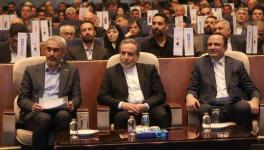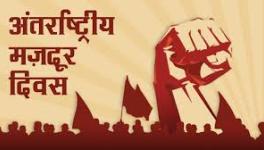Europe in Crisis: What next?
Will the European Union survive the upcoming elections in Netherlands, France and Germany?
In a crisis ridden Europe, which is seeing a rise in right wing forces, is there a hope for the left and democratic forces?What are some of the progressive policies that could help deal with the ongoing crisis?
Newsclick talks to Francine Mestrum from the Global Social Justice, on these issues and more.
Rough Transcript:
Prabir Purkayastha (PP): Hello and welcome to Newsclick. Today we have with us Francine Mestrum of the Global Social Justice and of course a long term associate with World Social Forum. Francine, Europe is presenting a very complex picture to most of us. It seems to us that European Union project is really running out of steam and there are irreconcilable differences in the heart of Europe. Political union is not there but there is a monetary union. What is going to happen to the new set of elections that are taking place? You have elections in Holland, elections in France, we will also have elections in Germany. So how do you see this scenario panning out with respect to European Union? Do you think European Union will survive this elections?
Framcine Mestrum (FM): Good question. I wish, I could look at the future. The situation is very risky, it is dangerous because as you know social democracy is running out of steam as well. The radical Left in all these countries is rather divided. So people go to extreme Right. Maybe, I can give a very simple explanation for this because people need protection. People at this moment, because of the European Union, because of Globalization, feel dis-protected. So, there are only two ways to offer protection. One is social and economic right, with the welfare state. But the other is with close borders, with stopping migration with the military, with the police and that is what the extreme Right is offering. So people go for that protection because the other protectionists are failing. So, in Holland as well as in France as well as in Germany and in other countries, there is a real threat of the extreme Right. So all we can do is hope that some other protection will be offered and that people will realize that this close borders and this very narrow nationalism can not be a long term solution.
PP: The economic part of the nationalism is to protect my job otherwise, migrants will come and take the jobs away but that's not the major issue. The major issue is really that the economy is not growing. The financial crisis of 2008 is still there and German banks have imposed, essentially Germany has imposed, a deflationary policy in Europe by which there is extremely no hope of at least a large number of countries in Europe recovering from their crisis.
FM: There is no chance of any solution as long as these austerity politics are going on. No chance. But what we can hope, there is small hope, but we should hope is that at least social democratic leaders may come into power and they stop a change at this austerity policies. But let us be clear as well. There are no jobs. But if you look at their needs, there are so many needs unfulfilled, that there are jobs for all. That is one and secondly, if you can't do all the work, that's needs to be done with less hours of work. We should reduce the working time.
PP: Six hours a day, five days a week, four days a week...
FM: But you have that in Sweden ,but it had not given good results.
PP: So you are saying it is really again a question of redistribution differently and that's something which is the only way then to produce jobs and so on.
FM: What we should not forget as well is that with the high levels of inequality today, but Europe is not that bad compared to rest of the world, but there are high levels of inequality that make democracy impossible. What has happened is that with 30 years of neo-liberalism and that project is also at its limit. It can't go on as it has been going on. So, the only way is if you do not want to turn to more social policies and to move to progressive policies is repression. It is criminalization of social movements and that is what is happening now with the arrival of these right-wing and extreme right-wing forces. Neo-liberalism needs this because it is brought itself.
PP: So that was the argument that it wants a smaller state except for the repressive arm of the state.
FM: We should start with the social policies because that is what gives people trust, what gives people confidence in themselves and confidence in others.
PP: So then you be in social policies such as..
FM: Economic and social rights. Universal rights for all, because this is the way that you can give people jobs, give people value, value of the work that they are doing, all of them - men and women - for what kind of work, what kind labour they are doing. But if people have confidence in themselves, have confidence in future, have confidence in their politics then I think we can go ahead. It is a very old saying, I think it is in the constitution of International Labour Organization, “you can not have peace, without social justice”. That is why my organization is working on social justice, because I think this is really a condition for people to work together and for building trust in others.
PP: You know, at the moment we are having very high levels of youth unemployment. For instance in Greece and Spain and also possibly in other countries. So do you think that instead of what is now being proposed, basic income, do you think that we should propose other measures?
FM: Absolutely. Basic income is not a notion. Basic income is a liberal solution for the individual. And for the people who do not trust state to organize redistribution. I am absolutely against basic income. I am for minimum guarantee income for people, which should also give people work. People have to organize themselves. But you should organize in such a way that the interdependence between people becomes clear, whether people can trust the state and trust the others. I think in that way, so are people are not afraid anymore. Tomorrow, may be I will be ill and I can not go to work. Tomorrow, my child will not be able to go to work. Tomorrow, I will have no land to work on. All these basic needs. We all have the same needs. These needs should be fulfilled. If you say that there is a very less usual employment. Yes, there is. But look at the needs that there are and it is only because of austerity policies, that these needs can not be fulfilled.
PP: Are there political organizations raising these issues in the elections that are on the anvil?
FM: Well I guess, again the problems are same all over the world. Media are very neo-liberal and restricted in what they can do. The moment you mention the real social protection, or if go beyond social protection, we work on social comments. That's Left, we are not going to talk about that and you are marginalized. Whereas from that side, new ideas are coming up and I think that there are very interesting new concepts that we can work with, but we will have to rethink a lot of concepts, lot of our ideas so that we can make a very interesting and attractive offer our people
PP: Yes, but you have three elections taking place, that we are taking. Holland, France, Germany. Are these issues on the anvil or is it between essentially the far Right and the neo-liberal but relatively may be a little more liberal parties. Not to say the conservative neo-liberal but liberal neo-liberal forces. What is now social democracy in France and Germany?
FM: I told you, a Social Democratic candidate in France is proposing basic income and that is why he has won the primaries. So this is really bad. This is really bad. The radical Left in France is proposing real social protection. May be a bit too conservative as well. But at least, social rights. In Holland, oh dear, you know in Holland they have officially a participation society and that means that it is based on the participation of citizens. We call this in Europe social innovation and it means that the state withdraws. There is no welfare state in Holland any more. People organize themselves to take care of all the people, to take care of all the children and you also pay for it. So it is real abandonment of state, state has withdrawn and citizens do it themselves and they call it participation. Which is of course not the real participation that we want. This is a very dangerous development. It can go in all directions. What will happen and there is one advantage of this basic income discussion that is we know that this is not affordable. Unless you abandon the welfare state and that they never accept in France. So there will never be a basic income in France, then you will have to abandon the health care which liberals want of course. They are proposing, and promoting a basic income so that they can privatize health care, so that they can privatize pension so that they can privatize everything. So we have to take care of that. But the interesting thing in France is that the neo-liberal candidate, candidate of the Right, he won the primaries with the promise of dismissing huge amount of civil servants and abandoning almost all of welfare state. Therefore, the Right is okay. But now that he is a candidate, he knows that he can not do this because his extreme Right competitor, she is promoting social rights. Extreme Right has always done for nationals. So now he is also well okay, no no we are social right, no no, we keep health care... but the point of the welfare state is really is the heart of all political debates in Europe at this moment. This is something we should take note of, we should prepare for and come with our own ideas for a better welfare state, less bureaucratic, more democratic, more real participatory. Again I think that there is some future in that.
PP: It is interesting what you said that Le Pen is essentially sounding on the issue of welfare better than for instance candidates of the Right. So the far Right of this issue seems to be offering more protection for the poor than the not so far Right is proposing. It is an interesting dichotomy if you will. Thank you Francine. We will catch up with you once the cycle of elections are over and take stock of what happens because these three elections are going to be quite crucial the way European Union is going to shape up in future. Thank you very much.
DISCLAIMER: Please note that transcripts for Newsclick are typed from a recording of the program. Newsclick cannot guarantee their complete accuracy.
Get the latest reports & analysis with people's perspective on Protests, movements & deep analytical videos, discussions of the current affairs in your Telegram app. Subscribe to NewsClick's Telegram channel & get Real-Time updates on stories, as they get published on our website.
























